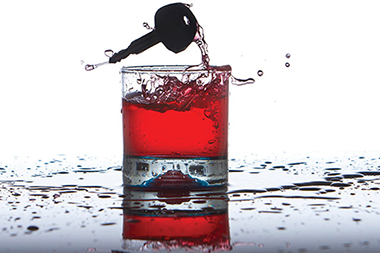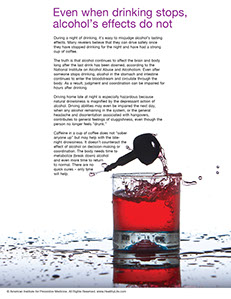MEDICAL NEWS
Even when drinking stops, alcohol’s effects do not

During a night of drinking, it’s easy to misjudge alcohol’s lasting effects. Many revelers believe that they can drive safely once they have stopped drinking for the night and have had a strong cup of coffee.
The truth is that alcohol continues to affect the brain and body long after the last drink has been downed, according to the National Institute on Alcohol Abuse and Alcoholism. Even after someone stops drinking, alcohol in the stomach and intestine continues to enter the bloodstream and circulate through the body. As a result, judgment and coordination can be impaired for hours after drinking.
Driving home late at night is especially hazardous because natural drowsiness is magnified by the depressant action of alcohol. Driving abilities may even be impaired the next day, when any alcohol remaining in the system, or the general headache and disorientation associated with hangovers, contributes to general feelings of sluggishness, even though the person no longer feels “drunk.”
Caffeine in a cup of coffee does not “sober anyone up” but may help with the late-night drowsiness. It doesn’t counteract the effect of alcohol on decision-making or coordination. The body needs time to metabolize (break down) alcohol and even more time to return to normal. There are no quick cures – only time will help.

Download an offline pdf file.
MEDICAL NEWS ARTICLES
<
>
2021 © American Institute for Preventive Medicine - All Rights Reserved. Disclaimer | www.HealthyLife.com








